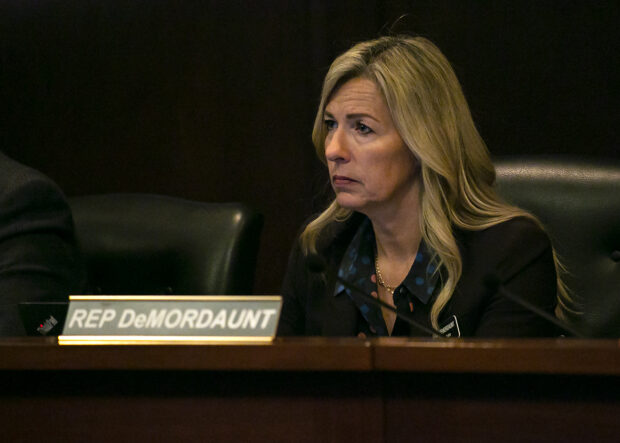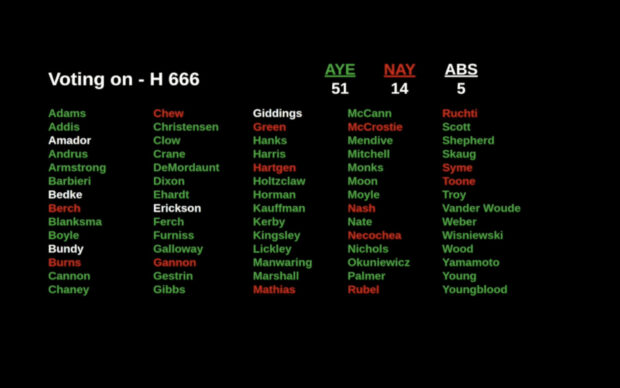
A bill that could open employees at schools, museums and libraries to a maximum $1,000 fine and a year in jail for “disseminating material harmful to minors” easily passed the Idaho House Monday.
House Bill 666 would remove an exemption in state law that shields museums, public libraries and schools from prosecution, effectively making it a criminal act to disseminate such materials to children. It would apply to K-12 schools, colleges and universities.
An hour-plus debate featured raised voices, impassioned decrials of pornography and back-and-forth between attorney legislators, playing out mostly along partisan lines.
“For many years, I as a parent have been concerned about the obscene and pornographic materials that find their way into our schools and public libraries,” bill sponsor Rep. Gayann DeMordaunt, R-Eagle, said, noting that she believes the trend has been “inadvertent.”
Rep. Steve Berch qualified that, “I’m not for pornography. I’m not supporting pornography in libraries,” but condemned the bill on two occasions.
“The America that I grew up in, and I was born, and … that I love does not write bills and create laws that throw librarians in jail,” said Berch, D-Boise.
The bill passed through the House State Affairs Committee last week, over the objections of librarians, who said it seeks to criminalize them for inadvertently allowing children to access salacious texts. Parents supported the bill in committee, many of them hoping it would stop their children from encountering books that depict sex and LBGTQ experiences.
No lawmaker suggested that LGBTQ texts would be considered “harmful” Monday, but many questioned which personnel and which materials the bill would target.
They didn’t come close to a consensus.
What are ‘harmful materials?’
The bill doesn’t answer that question. But a part of law it’s connected to does, DeMordaunt argued.
The legal definition includes a range of materials, from books to movies, that depict human “nudity, sexual conduct or sado-masochistic abuse … harmful to minors.” It also includes narrative accounts of some sexual activity, and “Any other material harmful to minors” in its definition. Materials have to be “knowingly” given out to invoke prosecution,” attorney and Rep. Greg Chaney, R-Caldwell, pointed out.
State law also includes what is not harmful to minors: a material that “possesses serious literary, artistic, political or scientific value for minors, according to prevailing standards in the adult community, with respect to what is suitable for minors.”
But the bill still leaves ambiguity in that definition that puts librarians at risk “unconstitutionally,” said House Minority Leader and attorney Ilana Rubel.
“Criminal laws have to be crystal clear. You need to send a bright, bright red line to the public on when they are violating the law and when they are not. And you really can’t be mushy on that without running afoul of due process guarantees and (the) Constitution,” said Rubel, D-Boise.
But Chaney contended that a 1973 Supreme Court case provides a “backstop” for enforcement, helping delineate what is and isn’t a constitutional regulation of free speech — and in turn, limiting the cases in which Idaho librarians and teachers could be prosecuted.
“(U.S. Supreme Court) Justice Potter (Stewart) famously said, ‘I can’t define pornography for you, but I know it when I see it.’ Well, I think this is one of those situations,” Chaney said.
But librarians won’t all know when case law does and doesn’t protect them, Rubel countered. “It’s very unfair to our librarians and educators to ask them to operate in a world where they have absolutely no idea what is legal and what is not and what will send them to jail and what will not.”
The ‘super secret folder’ and subjectivity
Often cited in lawmakers’ debate was a folder of texts and drawings including sexual content that lawmakers and parents said they drew from public libraries. As it was made available to House members, Rep. John McCrostie, D-Garden City, said some parents or grandparents could use the contents of the “super secret folder” to foster “healthy discussions” if a child is old enough. But Rep. Bruce Skaug said “I can’t unsee” the “obscene” materials included in it.
“I would rather my 6-year-old grandson start smoking cigarettes tomorrow than get a view of this stuff one time at the public library or anywhere else,” said Skaug, R-Nampa.
Rep. Barbara Ehardt, R-Idaho Falls, built off the claim.
“I would rather a child learn about (critical race theory) than be exposed to sexuality and sexuality content,” she said.
One text that parents and lawmakers included in the folder came from a best-selling sex education book, said Assistant Minority Leader Lauren Necochea, illustrating the divides over what parents consider to be suitable for children.
“That gets to the heart of how subjective this is,” said Necochea, D-Boise.
Librarians argued in committee that lawmakers’ concerns about the “super secret folder” wouldn’t go away with the bill. Notably, the bill wouldn’t ban “harmful materials” — however they’re defined — from library shelves. It would simply bar employees from “disseminating” them.
Other sticking points
Once a court determines whether “harmful materials” have been handed out, who would be prosecuted?
That remains unclear. Neither the bill nor its sponsors have clearly identified who would take the hit. That goes for teachers and school administrators, museum curators and tour guides, and other positions.
The ambiguity on that question caused some contention, as did a litter of other arguments.
Rep. Lori McCann, R-Lewiston, voiced another concern: that minors who attend colleges and universities before turning 18 could be exposed to “harmful materials” in higher education courses that deal with the body and sexuality. But the moderate eventually voted for the bill, which passed nearly on party lines.
Only Reps. Linda Wright Hartgen, R-Twin Falls, and Scott Syme, R-Wilder, crossed the aisle and voted against the bill.

Now, HB 666 heads to the Senate. It would have to clear a committee and the full Senate in order to reach Gov. Brad Little’s desk.
